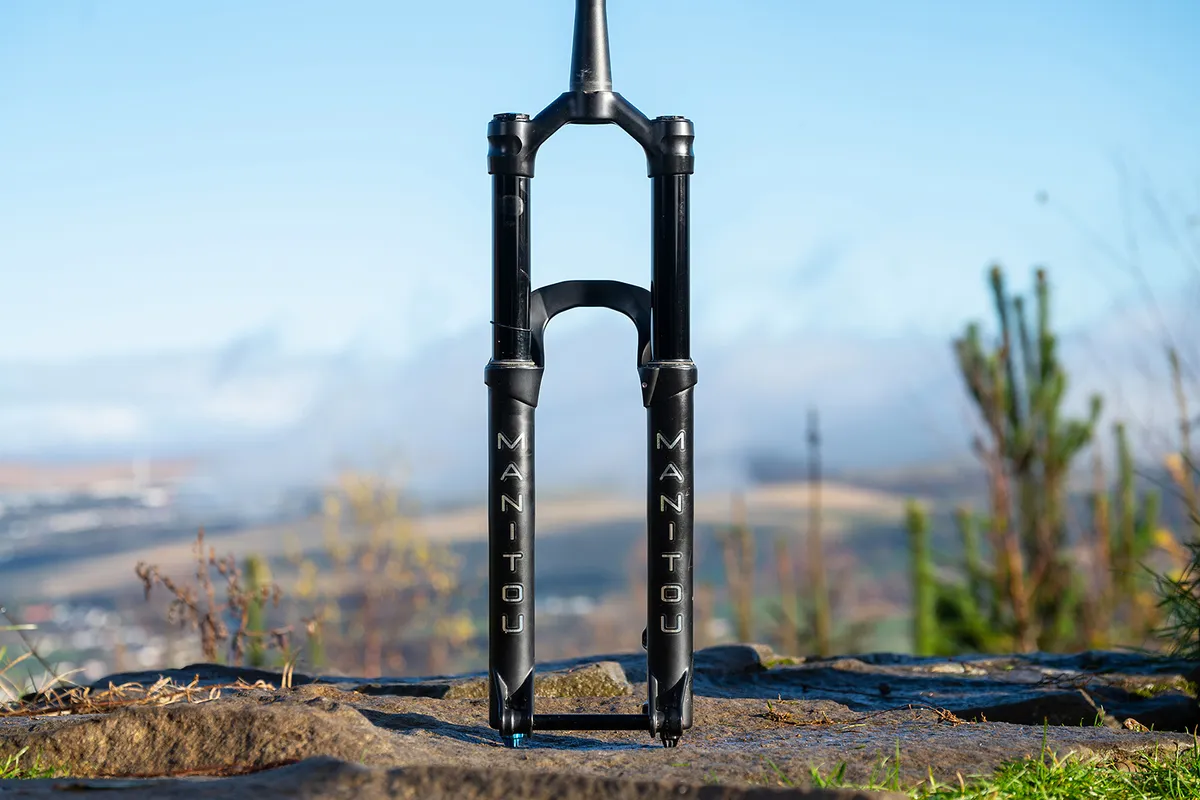Suspension forks are commonplace on virtually all modern mountain bikes, thanks to the comfort, traction and control they bring to your riding. While you can spend more than £1,000 on a fork, the forks in this list still provide brilliant performance, work well in most scenarios and are easier to adjust.
In short, upgrading to one of these forks is a sure way to improve your mountain bike’s suspension and get the most out of your riding.
Our reviewer, Luke Marshall, tested the forks you see here. He assessed them in the real world for how well they handled small bumps and big impacts, and considered how easy they were to set up.
The MTB forks in this test cost between £570 and £700. That’s about half the price of some of the flagship models offered by the same brands. If your budget can stretch higher, check out our list of the best mountain bike forks.
SQUIRREL_PLAYLIST_10132751
Navigation
- Best mountain bike forks under £700
- What we looked for in the forks
- Why you can trust BikeRadar
- MTB forks buyer's guide
Best mountain bike forks under £700
RockShox Psylo Gold RC
SQUIRREL_TEXT_13089870

- Price: £580 / $539 as tested
- Pros: Great off-the-top sensitivity; one of the cheapest properly capable big-travel forks; damper can be upgraded to Lyrik spec if needed
- Cons: Motion Control damper lacks low-speed support and is occasionally harsh over big impacts
RockShox’s latest mid-range fork uses the new Isolator RC damper, which isn’t a million miles away from the Charger 3.1 unit fitted to premium RockShox offerings, such as the Lyrik. The Psylo’s damper offers low-speed rebound adjustment and three low-speed compression settings – ‘open’, ‘pedal’ and ‘firm’.
In the ‘open’ setting, the RockShox fork is very active and incredibly sensitive, fluttering in and out of its travel and doing a magnificent job of keeping the front wheel in contact with the dirt.
On steeper trails or when ploughing into fast, rocky sections, the Psylo RC doesn’t feel quite as rock-solid or supportive as the Marzzochi Z1 Rail, but there’s still enough to push against when you need to load up the front end.
Even on long, rough bike-park runs, the RockShox fork feels impressively comfortable, performing better than many models that cost twice the price.
- Read more: RockShox Psylo Gold RC review
Specs
Wheel-size/travel options: 27.5in and 29in with 130mm, 140mm, 150mm and 160mm | Weight: 2.28kg (29x150mm)
SQUIRREL_13089870
Marzocchi Bomber Z1
SQUIRREL_TEXT_13083767

- Price: £659 as tested
- Pros: Burly chassis inspires confidence; composed damping
- Cons: Initially unwilling to use full travel
The recently updated Marzocchi Bomber Z1 swaps the lauded GRIP damper for the updated RAIL 2.0. The chassis has also been tweaked with new bypass channels on the lower legs, which are designed to better lubricate the bushings.
A stop-anywhere lever-style adjuster enables you to tweak the low-speed compression damping on the fly. There’s a rebound dial, too.
The included settings guide on the lowers helps you set the pressure in the Fox EVOL air spring and gives a starting point for the rebound damping.
We ended up ditching both volume spacers to access the full travel and maximise comfort and, while the first 10 clicks of rebound damping (out of 22) felt okay, we settled on running the adjuster fully open to get the Z1 to return fast enough.
The Bomber was the most burly-feeling fork of the group Luke tested, despite having the same 36mm-diameter stanchions as the AION36X. With its broad stance, solid chassis and supple-yet-supportive nature, it’s ideal for hard chargers. Smash it head-on into jagged rocks and it’s impressive how composed it feels.
While the RockShox Psylo edges ahead of it in terms of price and offers a more forgiving ride in choppy terrain, the Z1 betters it when it comes to support and control.
Specs
Wheel-size/travel options: 27.5in and 29in with 140mm, 150mm, 160mm and 170mm | Weight: 2.2kg (29in x 150mm)
SQUIRREL_13083767
Manitou Mezzer Expert
SQUIRREL_TEXT_13119751

- Price: £700 / $849.99 as tested
- Pros: Impressive performance for the money
- Cons: Support mediocre; digital pressure gauge is a necessity for setup
The Mezzer Expert comes with Manitou’s ‘Reverse Arch’, which sits behind, rather than in front of, the 37mm stanchions.
External adjustment is limited to a six-position low-speed compression-damping dial, a lockout and a low-speed rebound adjuster. There’s also a self-equalising negative spring and an ‘Incremental Volume Adjuster’ (IVA), which enables you to change the positive air chamber volume by rearranging self-contained spacers.
The Reverse Arch’s appearance may divide opinion, but it works well enough – the Mezzer Expert’s accuracy through technical sections is good, and we never noticed any binding under high-load turns or sharp direction changes, either.
The fork feels stiff, but not harsh. Blasting along chattery trails, its low breakaway force means it sits comfortably in its sag and soaks up small bumps well, providing tons of grip and confidence in corners and root or rock sections.
Support is mediocre, but it can use its travel and recover from repeated hits quickly. Progression to the end-stroke builds smoothly, with no sharp spike in ramp-up. We were never hesitant landing drops or ploughing into deep compressions. Pummel through a rock garden and the fork lends a calmness to the front end that helps boost confidence.
- Read more: Manitou Mezzer Expert review
Specs
Wheel-size/travel options: 27.5in and 29in with 140mm, 150mm, 160mm, 170mm and 180mm | Weight: 2.09kg (29in)
SQUIRREL_13119751
SR Suntour AION36X Boost
SQUIRREL_TEXT_13097805

- Price: £570 as tested
- Pros: Good balance of support and sensitivity; easy-to-use cable clip, axle and fender attachments
- Cons: Not quite as plush as some other forks
The reasonably priced AION36X offers a three-position low-speed compression dial that enables you to toggle between ‘open’, ‘mid’ and ‘firm’ settings. There’s rebound adjustment, too. You can adjust the spring volume using the provided volume spacers.
After some careful balancing of spring rate and volume, the SR Suntour AION36X uses its travel efficiently, remaining sensitive enough to track well through rooty turns and keep the front wheel gripping, while also offering up full travel without lacking support when needed.
While it can’t match the RockShox Psylo or Marzocchi Bomber Z1 for overall sensitivity, the AION36X’s tool-free cable clip is easy to use, as is the quick-release Boost axle, plus there are fender attachments and even an ABS-mount version.
Specs
Wheel-size/travel options: 27.5in and 29in with 120mm, 130mm, 140mm, 150mm and 160mm | Weight: 2.31kg (29in x 150mm)
SQUIRREL_13097805
What we looked for when testing the best budget MTB forks
Former downhill racer and technical writer Luke Marshall conducted a deep dive into the budget suspension forks on this list. He judged whether they met the brands’ claims and compared them to their closest competitors.
To be a top performer, a fork has to absorb smaller bumps without spiking, in order to provide comfort and traction. In its mid-stroke, it must provide support through high-load berms or compressions. It also needs to have plenty of smooth bottom-out resistance.
But that’s not all – it also needs to be relatively easy to set up and offer plenty of usable adjustability, so that it can work for people at the extreme ends of the riding style and weight bell-curves.
Why you can trust BikeRadar
BikeRadar has been an authority on bikes and cycling tech since its inception in 2007, delivering the world’s best riding advice.
We have experts testing all types of bikes, parts, clothing and accessories, from road, mountain and gravel bikes to commuting, bikepacking and electric bikes.
Our reviews are always editorially independent – with no exceptions. Our reviewers comprehensively test all products in the real world, always reflecting on performance, value and the wider market when delivering their verdicts and review ratings.
We have more than 15,000 product reviews available at your fingertips, as well as expert buying, maintenance, training, skills, health and fitness advice.
Our annual Bike of the Year test is an industry benchmark and the BikeRadar team consists of some of the most experienced riders and testers in the business.
What to consider when buying mountain bike forks

Suspension travel
When looking to upgrade your suspension fork, it’s crucial to know how much suspension travel you need.
In most cases, it’s best to upgrade your fork to a model with the same amount of travel. If you are currently running a 150mm fork from stock, you should be swapping it for another 150mm option.
There are exceptions here, and you can get away with running a fork that has 10mm more travel than the rear end of your bike (in the case of a full-suspension bike). However, upping your fork travel will affect your bike’s geometry, so bear that in mind.
Air spring
Look out for a fork with air springs, which are lighter and more easily tunable than coil springs.
Volume spacers
Another benefit of air springs is their ability to be tuned with volume spacers, which are small plastic pucks housed out of sight in the air chamber of your mountain bike fork.
These little pieces of plastic, also known as bottomless tokens or volume adjusters, are an easily overlooked part of mountain bike suspension and play a large role in the overall feel and performance of your suspension setup.
By adding volume spacers to the air chamber, the volume of air in the spring is reduced. By reducing the air volume in the chamber, the natural progressivity of air comes into play sooner. This causes the suspension to ‘ramp up’ (become noticeably more progressive) earlier in its travel.
Volume spacers are a great way to eke every last drop of performance out of a fork and guarantee the best setup for your weight and riding preferences.
Externally adjustable compression and rebound damping
Having easy access to your compression and rebound damping makes a big difference when setting up your suspension fork.
All forks at this price range should offer externally adjustable low-speed compression and rebound damping. Rebound damping is commonly adjusted via a knob at the bottom of the right suspension leg, while compression is found at the top. Most budget MTB forks will either have a three-position compression dial or a stopless dial that offers infinite adjustment between ‘open’ and ‘closed’ settings.
Which style of compression adjustment you want is up to you, but it’s worth noting that the ‘stopless’ dial can easily be knocked into an undesired position accidentally.
Chassis and stanchion stiffness
The diameter of the stanchion and consequent burliness of the fork chassis plays a big role in how stiff (and therefore confident) it feels on the trail.
Most forks for trail riding have stanchions in the 35mm to 36mm range. Anything more than that is getting towards longer-travel enduro forks, while forks closer to 32mm are aimed at the cross-country end of the spectrum.

